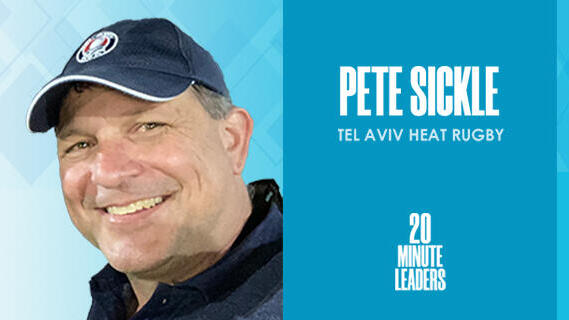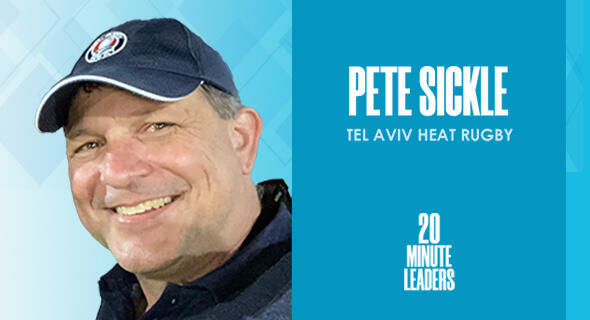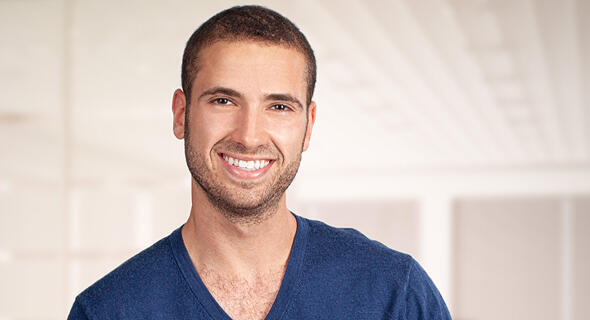
20-Minute Leaders
“Players have to know that they will be valued, trusted, and listened to.”
Tel Aviv Heat CEO Pete Sickle shares that his culture of being valued and listened to has created a waiting list for players to join - here's how
In 2021, Pete Sickle and a small group had only months to create a professional rugby team in Israel from scratch. Without the resources of a big, established club, they chose to be very intentional about creating an environment players would want to be part of. Sickle, now CEO of the Tel Aviv Heat, shares that the culture of being valued and listened to has created a waiting list for players to join, and he is proud the team can be a launching pad for players to go on to bigger things. He explains that rugby has a long tradition of values like passion, respect, and solidarity. Sickle’s job is to make sure that these values are fully on display within the organization, bring the mindset of Israeli innovation into the rugby world, and make sure his coaches and players have what they need to compete at a high level.
Click Here For More 20MinuteLeaders
Today you're running the Tel Aviv Heat rugby team. What happened there?
Rugby is an old game, but it's only been professional for the last 27 years. The tier two nations have a hard time getting parity to tier one. World Rugby about two years ago said, "We need to help tier two rugby to improve their rugby." Rugby Europe went out and tapped England, Ireland, Scotland, Wales, France, and Italy and said, "Let's take the next seven highest ranked teams in Europe and start a competition." They opened an eighth wildcard slot for bids.
I wasn't involved at this stage. In March of 2021, Rugby Europe said, "Congratulations, you're in. The first game is in September.” Rugby Europe was very impressed and saw the opportunity for a country like Israel, which is really tier four. They were taking a real risk on us, but they were very impressed by our vision, that given the opportunity to play rugby at a professional level, you could transform a country from tier four to tier two.
You have a personal interest in rugby?
I was introduced to rugby in high school in Los Angeles. I fell in love right away. There was something special about rugby. Not only the freedom and the flow of the game on the field, but the rugby values. The World Rugby values are passion, respect, solidarity, integrity, and discipline. However tough and sometimes violent it can be during the game itself, at the end of the game, you shake hands genuinely.
What does that mean? Every team is supposed to shake hands after every sport.
If you really look carefully, they are giving each other genuine hugs. The tradition in rugby is the home team then hosts the visiting team. Even at the highest professional levels, you'll find the losing team gets invited into the winning team's locker room for a beer.
Once the bid was approved, I got invited to join the founding team. We didn't have a team name, we didn't have a dollar in the bank, we had no players signed. We had a head coach, Kevin Musikanth. He was already the Israeli national team coach.
Take me back to the day that you decided to be a co-founder and CEO of this new startup. How do you even structure what your priorities are with a deadline, unlike many startups?
I didn't come in as CEO. There were five or six of us that were all dedicated to this new mission. We didn't come in with set roles. We had until May to sign a participation agreement with Rugby Europe. In March, it's a vision. The first mission was to make sure that we can be viable financially.
So full court press, from March to May, let's see how much money we can raise. By May, we had raised about a third of our target for our seed round. We saw our vision is not just the five or six of us. Others can see the opportunity and the value that we can create. So we signed our participation agreement.
How do you pitch a sports team in that capacity?
The pitch was most receptive outside of Israel. One of the great strengths of rugby is its great tradition. But here was an opportunity to build a club from scratch. We have the hardcore rugby people who were drawn to it. We also had people who are hardcore supporters of Israel and said, "If this is going to help elevate Israel, I want to be part of it.” Of course, we had people who were both: ardent supporters of Israel, but also passionate rugby people. The pitch was, "This will be the vehicle to elevate rugby in Israel. We see a path for Israel to vie for a spot in the Olympics and the Rugby World Cup.”
We signed the contract with Rugby Europe. We couldn't really go to the sponsors until Rugby Europe announced it in July.
When is the season starting?
September.
You're taking it down to two months of training because you don't have the resources yet.
We don't have the resources. Most of our player contracts were signed in July and August. We didn't have a name. We had a few of us saying, "Oh, that name sounds good." We found a logo designer online.
The first hire was the assistant coach, Demetri Catrakilis, who also had his playing career cut short because of injury. They then had an extensive network of former teammates. When we were trying to get players, we couldn't wow them with money. But the story was, "We're going to give you a great team to play for. This team is built around players and what's important to players."
How does that come to play in the day-to-day?
We want to make sure that we're meeting their needs. To get them to take the risk to come play for the Tel-Aviv Heat, they have to know that they're coming to an environment where they are valued, trusted, and listened to. I meet with each player. I say, "Tell me what's been your experience."
What you're talking about here is building a culture. What do you as a CEO do to get players to really feel like you're listening?
First of all, it's to listen to them. They needed to know that I was there. We were on the road for the whole month of October; I was with them. I'd say, "Thanks for joining us. We want to give you the best experience. Let me know how we can make this better." Then making sure that when that did happen, we weren't defensive. We could have honest conversations. They needed to know that any promise we made, we delivered on it. When we couldn't deliver on it, we didn't make false promises.
I see myself as a servant leader. The job of the player is to compete. The environment that you create for players is critical to how they perform. The coaching staff, their job is to create that environment. My job is to make sure that the coaching environment has the resources to deliver it.
We're in September. How do you strategically think through aligning expectations?
We had players from Israel, South Africa, Fiji, the UK, Namibia, and Ireland. In season one, there was also COVID, so when we were planning our pre-season at the end of August, Israel was closed. We ended up at pre-season in South Africa. We had six players from Fiji, and we couldn't get them into South Africa. We meet in Georgia about five days before our first game.
Now, we lose our first game. But Georgia is ranked 12th in the world. We lost, but by like 20 points. It was respectable. They're singing in the locker room, and I mean real singing. These guys are singing on the bus. We're looking at each other, "We're tapping into something special." If you can walk off the field losing by 20 points and be singing with one another, it's because you're seeing each other as family.
When we started recruiting, as soon as someone said, "I'll sign up,” we were so excited. Right now, we have a waiting list of 200 players at an elite level because they're hearing from their friends about the Tel Aviv Heat.
In the rugby world, there's a lot of conventional thinking that every hour is scheduled. It's top-down, it's "Here's the program. Fit in or get out because we'll find someone younger and cheaper." We expect high professional standards. But when we're not in the gym or on the training session or watching films, we trust them to figure out what they need to do and build that culture of trust, camaraderie, and mutual respect. It's about inspiring them.
We're so proud that having this opportunity of coming to play for the Tel-Aviv Heat now is a launching pad. If they play for the Tel Aviv Heat and they go on to bigger and better things, it's not a loss; it's a feather in our cap.
Where do you fit in to all of this?
In season one, my job as CEO is to make sure that the coaches and the players have what they need to perform. Of course, I need to be able to communicate our story. Very quickly, we understood there are rugby fans and Israel fans around the world that love supporting us. I think we have this amazing opportunity to be everyone's second favorite team. So keep rooting for your team. But now we have another team. It's a family; it's inclusive.
Those rugby values, everything we need to do as an organization has to be demonstrating that because we can't fall back on tradition. My job is to make sure that those rugby values are really embraced throughout the organization, but also bringing startup nation entrepreneurship into the rugby world.
Looking ahead to season two, my job is to make sure that we're growing this worldwide fan base. My challenge is to find those partners, whether they're investors or sponsors, who are going to grow with us on this worldwide level, and make sure as an organization, we do not lose that ability to provide a safe, trusting environment where it's about the players and employees.
Michael Matias, Forbes 30 Under 30, is the author of Age is Only an Int: Lessons I Learned as a Young Entrepreneur. He studies Artificial Intelligence at Stanford University, is a Venture Partner at J-Ventures and was an engineer at Hippo Insurance. Matias previously served as an officer in the 8200 unit. 20MinuteLeaders is a tech entrepreneurship interview series featuring one-on-one interviews with fascinating founders, innovators and thought leaders sharing their journeys and experiences.
Contributing editors: Michael Matias, Megan Ryan

